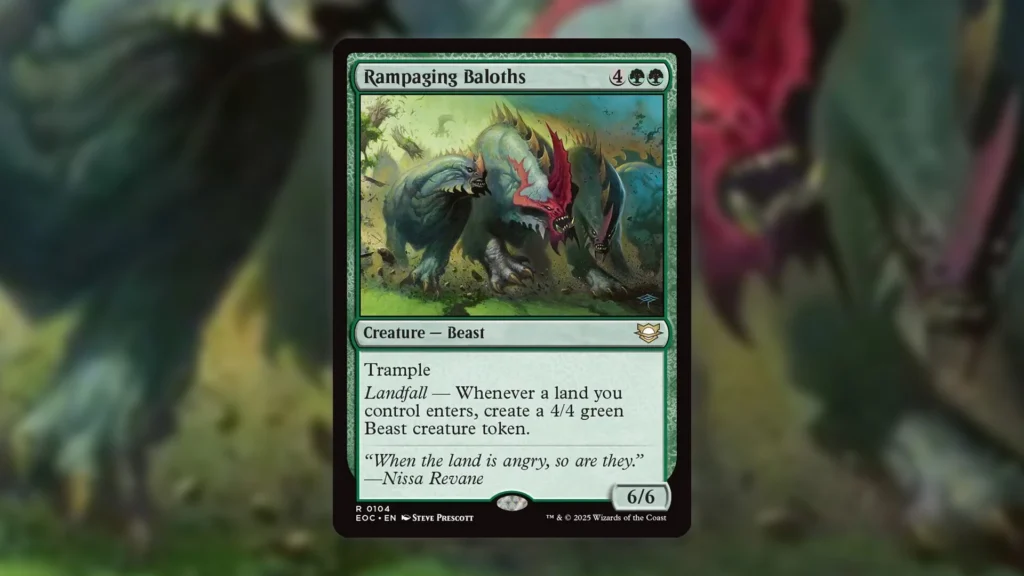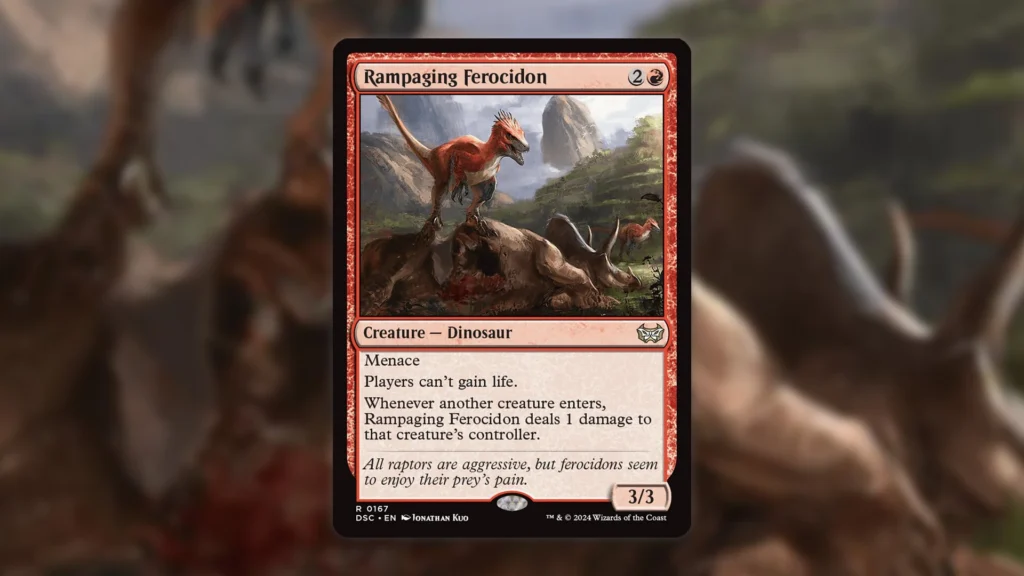Over the years, many cards have received errata for a variety of reasons. In some cases, an error in printing requires a rules change for the card to function as intended. Other times, the Oracle text on a card is changed to make it cleaner or easier to understand.
In the age of MTG Arena, however, we’ve also started to experience rules changes that make it so cards run better on digital platforms. A recent change to a popular Commander and Brawl staple is believed to fall under this camp and has thus garnered a lot of attention. Similar changes were made in the past. While simplifying game actions on MTG Arena has its benefits, it’s clear that many players feel altering the Oracle text of cards for digital benefits is a slippery slope.
Rampaging Baloths Errata

The errata in question affected Rampaging Baloths, a card that was reprinted in the World Shaper Edge of Eternities Commander Precon. The alteration is very small, but if you look closely at the text box on Rampaging Baloths above, you’ll notice it reads differently than any other printing of the card in the past.
With the release of Edge of Eternities, the official Oracle text associated with Rampaging Baloths’ Landfall ability would read “Whenever a land you controls enters, create a 4/4 green Beast creature token.” By contrast, it used to read “Whenever a land you control enters, you may create a 4/4 green Beast creature token.” This is a minor shift, all things considered, but it does make the card marginally worse. This isn’t the only “you may” text that has been removed from a card in the past, either.
Back in 2019, Ajani’s Pridemate underwent the same procedure. Prior to receiving a reprint as part of the Challenger Decks 2019 (featuring the War of the Spark expansion symbol), Ajani’s Pridemate supposedly received errata for a few different reasons. The first has to do with a change in tournament policy.
A while back, missing any trigger, even beneficial ones, resulted in a warning at the competitive rules enforcement level. Accumulating warnings could lead to a game loss. Cards with beneficial triggers were often printed with the “you may” text to make the triggers optional and thus would be less punishing to a player who didn’t acknowledge the trigger (they just wouldn’t get the benefit).
Now, missing beneficial triggers doesn’t result in a penalty, making the “you may” text less necessary. Wizards of the Coast opted not to errata all cards with a similar line of text. However, because Ajani’s Pridemate was seeing increased Standard play, including on Arena, and was receiving a reprint in 2019, Wizards felt like then was the best time to make that particular errata official.
Six years later, Rampaging Baloths gets the same treatment. It’s a bit strange that the errata occurred with its reprint in Edge of Eternities Commander printing and not MTG Foundations, but otherwise the errata isn’t unprecedented.
For the sake of MTG Arena, removing the optionality associated with Rampaging Baloths is nice from a gameplay perspective. Players are no longer forced to click “yes” through each optional trigger in order to get their 4/4s. This makes the rope much less of a concern.
There’s reason to believe this played a role in the errata decision, even if not explicitly stated. Even with the benefits for digital play laid out, though, that hasn’t stopped players from voicing their frustration.
Areas of Concern

Many of the grievances players have with the Rampaging Baloths errata are actually very similar to those brought up with Ajani’s Pridemate. First of all, the idea of changing the functionality of cards in paper for what’s assumed to be MTG Arena’s benefit doesn’t sit right with everyone.
One downside some players brought up is that Rampaging Baloths has 16 previous printings that all read with the old text. This is an issue with all errata and why it’s in Wizards’ best interest to keep Oracle text changes to a minimum. Commander players with older versions of the card will need to remember that Rampaging Baloths has been changed.
Of course, in most cases, the difference in text won’t matter. After all, getting a 4/4 is a beneficial trigger, so you’d need a pretty good reason for wanting to purposefully not create a token. Unsurprisingly, though, players brought up cards like Rampaging Ferocidon and Trespasser’s Curse that punish you for adding creatures to the board. These are corner-case scenarios, but they do come up, and the errata can therefore completely change how games play out.
Another issue players brought up is the fact that errata aren’t being addressed consistently. Waiting for a card to be reprinted before making a change naturally creates inconsistencies between designs. Furthermore, there are examples of similarly worded cards that have been reprinted onto MTG Arena, such as Mold Adder, that didn’t receive errata.
Meanwhile, Emeria Angel, another token producer with Landfall originally printed in Zendikar just like Rampaging Baloths, has different Oracle text despite being templated the same way when printed. Paper players having to remember which “you may” cards received Oracle text changes and which didn’t is far from ideal.
Moving Forward
For better or for worse, the errata to Rampaging Baloths is a sign that cards that fall in the same category moving forward are subject to change. If a similarly worded card sees ample MTG Arena play in the future and a reprint is on the way, don’t be surprised if an Oracle text change follows.
Wizards of the Coast didn’t explicitly state that digital gameplay was a catalyst for the Rampaging Baloths errata. Regardless, given how popular Rampaging Baloths can be in Brawl and how annoying it is for players to keep clicking through optional triggers, it’s reasonable to suspect MTG Arena play was a factor.
Ultimately, this is a very small change, but the issue is largely that such a change is completely unnecessary. For a small Arena convenience, Rampaging Baloths, a very popular Commander card, will play worse in the format it actually sees the most play in; Commander.
It’s been a long time since the Ajani’s Pridemate errata, and MTG Arena players are still left wondering if an option to always say yes and always yield to a trigger (a feature that works well on Magic Online) will make its way to the client. Until then, errata may be the best form of recourse in spite of the surrounding negatives. Keep your eyes peeled for any other changes that come our way with future set releases.
Stick with us here at mtgrocks.com: the best site for Magic: The Gathering coverage!

